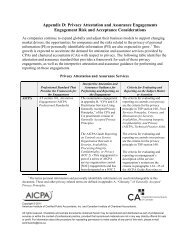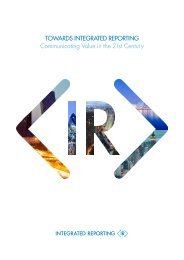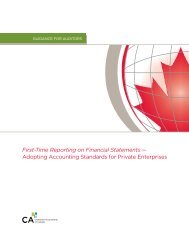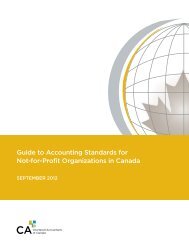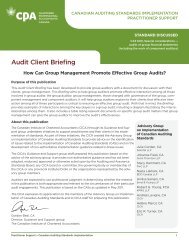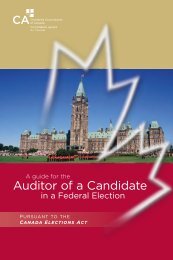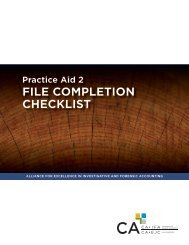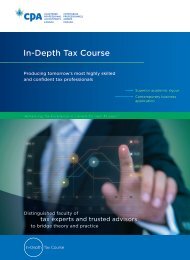20 Questions - Canadian Institute of Chartered Accountants
20 Questions - Canadian Institute of Chartered Accountants
20 Questions - Canadian Institute of Chartered Accountants
- No tags were found...
You also want an ePaper? Increase the reach of your titles
YUMPU automatically turns print PDFs into web optimized ePapers that Google loves.
<strong>20</strong> <strong>Questions</strong>Directors Should Ask aboutBuilding a BoardHugh Lindsay, FCA, CIP
<strong>20</strong> <strong>Questions</strong>Directors Should Ask aboutBuilding a Board
Library and Archives Canada Cataloguing in PublicationLindsay, Hugh<strong>20</strong> questions directors should ask about building a board/HughLindsay(<strong>20</strong> questions series)ISBN 1-55385-148-X1. Boards <strong>of</strong> directors. I. <strong>Canadian</strong> <strong>Institute</strong> <strong>of</strong> <strong>Chartered</strong><strong>Accountants</strong>. II. Title. III. Title: Twenty questions directors shouldask about building a board. IV. Series.HD2745.L45 <strong>20</strong>05 658.4’22 C<strong>20</strong>05-900502-5Copyright © <strong>20</strong>05<strong>Canadian</strong> <strong>Institute</strong> <strong>of</strong> <strong>Chartered</strong> <strong>Accountants</strong>277 Wellington Street WestToronto, ON M5V 3H2Printed in CanadaDisponible en français
PrefaceThe Risk Management and Governance Board <strong>of</strong> the <strong>Canadian</strong><strong>Institute</strong> <strong>of</strong> <strong>Chartered</strong> <strong>Accountants</strong> has developed this briefing to helpCorporate Governance Committees and others who are responsiblefor selecting members for Boards <strong>of</strong> Directors. The documentaddresses the factors that contribute to the creation <strong>of</strong> an effectiveBoard and describes a process for recruiting directors. It is intendedprimarily for directors <strong>of</strong> companies that are listed on stock exchangesin Canada and the United States but the principles it describes arealso, as good practice, appropriate for other organizations.This briefing provides practical guidance for directors in the form<strong>of</strong> suggested questions for each <strong>of</strong> which there is a brief explanatorybackground and some recommended practices. We hope thatdirectors will find it useful in assessing their present approach tobuilding or adding to a Board and enhancing it where appropriate.This publication is one <strong>of</strong> CICA’s series <strong>of</strong> publications on governancefor directors. The text includes references to other titles that expandon individual topics.The Board acknowledges and thanks Jeffrey Rosin and his associatesat Korn/Ferry International and the members <strong>of</strong> the Directors AdvisoryGroup for their invaluable advice, Hugh Lindsay, who wrote thisbriefing under their guidance, and the CICA staff who providedsupport to the project.Frank Barr, FCAChair, Risk Management and Governance BoardRisk Management and Governance BoardFrank Barr, FCA, ChairJohn Fraser, CABrian Ferguson, CALee Giles, CAMichael Harris, CAFred Jaakson, CAColin Lipson, CAMary Jane Loustel, CAThomas Peddie, FCAJosée Santoni, CADirectors Advisory GroupGiles Meikle, FCA, ChairJames ArnettWilliam DimmaJohn Ferguson, FCARobin KorthalsMary MogfordPatrick O’CallaghanGuylaine Saucier, FCACICA StaffWilliam Swirsky, FCA, Vice President, Knowledge DevelopmentGigi Dawe, Principal, Risk Management and Governance
IntroductionA strong, effective Board is a key contributor to the success <strong>of</strong> acompany. The Board is responsible for establishing the strategicand ethical directions <strong>of</strong> the company. It recruits, compensates andevaluates the Chief Executive Officer and establishes a successionplan for senior management. The Board is also responsible forthe oversight <strong>of</strong> risk management, internal control and corporatecommunications.Meeting these responsibilities requires the Board to have aneffective system <strong>of</strong> governance and to recruit directors who willwork effectively together to meet the expectations <strong>of</strong> the owners,legislators and regulators. The directors must collectively have theexperience, knowledge and skills needed to oversee the management<strong>of</strong> the company. They must work well together but there should bea creative and healthy tension that comes from the “constructiveinteraction” <strong>of</strong> people with different backgrounds.The Boards <strong>of</strong> listed companies are required to appoint a nominatingcommittee composed entirely <strong>of</strong> independent directors 1 . TheNominating Committee, which may also be the Corporate GovernanceCommittee, is responsible for identifying individuals qualified tobecome new Board members and recommending to the Board thenew director nominees for the next annual meeting <strong>of</strong> shareholders.This document groups the process <strong>of</strong> identifying and recruiting thebest possible candidates for the Board in three sections:• determining the Board positions to be filled;• establishing director qualifications; and• conducting the search process.A key consideration in the nomination <strong>of</strong> prospective members to theBoard <strong>of</strong> a public company is the company’s ownership structure.Some listed companies have shareholders with controlling interestsor large blocks <strong>of</strong> voting shares which may include multiple-votingshares (a significant factor in Canada). Through their voting powerthese shareholders can influence the selection <strong>of</strong> individual directorsor the entire Board. In these cases the challenge is to balance theinterests <strong>of</strong> controlling and minority shareholders.Institutional investors who manage pension and mutualfunds are increasingly using their voting power andinfluence to ensure that the Boards represent the interests<strong>of</strong> all shareholders.Major shareholders should respect the nominating process by electingdirectors who meet the criteria for Board membership.An effective board <strong>of</strong> directors is a combination <strong>of</strong> the rightpeople, the right structure, and the right procedures.McKinsey & Company:Investor Opinion Survey,June <strong>20</strong>021See question 1 for an explanation <strong>of</strong> independence.
Determining the Board positions to be filledThe first step in director recruitment is to establish the positions thatshould be filled to meet the Board’s needs. The positions are theChair <strong>of</strong> the Board and the chairs and members <strong>of</strong> committees. Mostdirectors will sit on at least one committee and some may serve onseveral.A critical issue for Boards is the independence <strong>of</strong> directors — a factorthat should be considered early in the nomination process.Prior to nominating or appointing individuals as directors,the board should... consider what competencies and skillsthe board, as a whole, should possess. In doing so, theboard should recognize that the particular competenciesand skills required for one issuer may not be the same asthose required for another.National Policy 58-<strong>20</strong>11. What are the independence requirements for directors?The Boards <strong>of</strong> Directors <strong>of</strong> companies listed on major stockexchanges in Canada and the United States must meet regulatorystandards and rules for independence. The requirements <strong>of</strong> thejurisdictions are generally the same but there are detailed differencesin the wording and applications. As mentioned in “How to use thispublication”, readers should not rely on this document for specificrequirements. They are encouraged to consult the current regulationsfor the jurisdictions under which their company is listed and ensurecompliance.<strong>Canadian</strong> regulators require listed companies (issuers) to disclosetheir corporate governance practices and to provide explanationsand justifications if the company does not follow the followingrecommended best practices:• The Board should be composed <strong>of</strong> a majority <strong>of</strong> independentdirectors.• The Chair <strong>of</strong> the Board should be an independent director.• The Board should appoint a nominating committee composedentirely <strong>of</strong> independent directors.• The Board should appoint a compensation committee composedentirely <strong>of</strong> independent directors 2 .Independence RequirementsNational Policy 58-<strong>20</strong>1 defines independence as“independent within the meaning <strong>of</strong> [section 1.4],Amendments to Multilateral Instrument 52-110 AuditCommittees.” That is, …independent if he or she has nodirect or indirect material relationship with the issuer.…“material relationship” is a relationship which could, inthe view <strong>of</strong> the issuer’s board <strong>of</strong> directors, be reasonablyexpected to interfere with the exercise <strong>of</strong> a member’sindependent judgement.For full description <strong>of</strong> “material relationship” see OSC,Amendments to Multilateral Instrument 52-110 AuditCommittees, Section 1.4, Meaning <strong>of</strong> Independence.National Policy 58-<strong>20</strong>12National Policy 58-<strong>20</strong>1 Effective Corporate Governance. Sections 3.1, 3.2, 3.10 and 3.15.
In addition, every listed company must have an audit committeewhose members are independent directors.A director is independent if he or she has no direct or indirectmaterial relationship with the issuer. A material relationship meansa relationship which could, in the view <strong>of</strong> the issuer’s Board <strong>of</strong>Directors, be reasonably expected to interfere with the exercise <strong>of</strong> amember’s independent judgement. 3The <strong>Canadian</strong> Regulations on Audit Committees provide detaileddefinitions and examples <strong>of</strong> material relationships.Some directors who have no material personal relationship with thecompany may potentially have conflicts <strong>of</strong> interest because <strong>of</strong> theirinvolvement with other companies. In such cases the directors woulddeclare their conflict and abstain from participating in discussions andvoting on the issues involved. If this happens too <strong>of</strong>ten it may not beappropriate to nominate them for reelection. Nominating committeesshould also consider this possibility when evaluating new candidates.How many?The Boards <strong>of</strong> large publicly traded companies havebetween five and fifteen members with an average <strong>of</strong> ten.Patrick O’Callaghan & Associates Governance Review <strong>20</strong>03.The present practice is to have three or four committees, each withbetween three and five members — a majority or all <strong>of</strong> whom must beindependent. Independent directors typically sit on two committees.Non-independent directors may sit on one or none.Calculating a Board size for a typical widely-held companyChair 1Committee membership (independent directors)3 committees with 4 members. Directors averagetwo committee memberships 6Non-independent directors 2Total 92. How many directors should we have?The effectiveness <strong>of</strong> Boards depends on the ability <strong>of</strong> directors todiscuss issues knowledgeably and openly. A Board should haveenough members to meet its needs for committee membership andexpertise, and provide a good diversity <strong>of</strong> views and experience. Itshould also be small enough to encourage lively, informed discussionand facilitate decision-making.Other criteria for determining Board size include:• legal and regulatory requirements for a minimum Board size;• the complexity and geographical scope <strong>of</strong> the company’s activities;• the range <strong>of</strong> knowledge and experience required from Boardmembers;• the difficulty <strong>of</strong> achieving a quorum; and• the cost.3Ammendments to Multilateral Instrument 52-110 Audit Committees.
3. How do we select the Chair?A strong and competent Chair is the single most important factorin Board effectiveness. The Chair should have the time and abilityto lead the Board and act as a liaison with the CEO and seniormanagement. Board meetings are the forum in which directors domuch <strong>of</strong> their important work <strong>of</strong> debating issues before giving theirapproval, direction and advice to the CEO.The majority <strong>of</strong> large <strong>Canadian</strong> companies separate the roles <strong>of</strong> BoardChair and CEO and this practice is growing steadily. They also avoidappointing former CEOs and others who have prior connections withthe management group.The Corporate Governance Committee should have the formalresponsibility for developing a process for appointing the Chair thatinvolves the entire Board. The committee may consult the CEO on theselection but should not allow the CEO to make the decision.CAUTION:Controlling shareholders are in a position to use theirvoting power to secure the appointment <strong>of</strong> their ownchoice <strong>of</strong> Chair and CEO. If the selection is unacceptableto the independent directors they may need to meetindependently to discuss their concerns and decide howto proceed.The Chair should have:• integrity;• demonstrated strengths in communication and leadership skills;• strong facilitation skills;• empathy for fellow directors;• a forward-looking perspective;• clear strategic vision;• the intellectual capacity to understand complex issues and theoptions for handling them;• an appreciation <strong>of</strong> accountability and the need to set and monitorstandards <strong>of</strong> performance;• the ability to assess priorities and focus on what is important;• the willingness and ability to prepare agendas with clear objectivesand to chair productive Board meetings;• political skills and the ability to use power;• the strength <strong>of</strong> character to deal effectively with a competent butstrong-willed CEO;• the ability to recognize and manage the creative tension betweenthe Board and the CEO;• the ability and knowledge to challenge views and opinions;• the ability to manage strong minded or intimidating members; and• the willingness and ability to take charge in times <strong>of</strong> crisis.[See also Crisis Management for Directors]The Chair must also have the time to do the job properly. Thedemands and complexity <strong>of</strong> the position are increasing and mayrequire as much as 50% <strong>of</strong> the Chair’s time — more in times <strong>of</strong> crisis.
Some Chairs now meet one-on-one with individual directorsat least once a year.The Corporate Governance Committee and Board are faced witha very sensitive situation when the Chair has failed to performacceptably and should not be re-elected. Traditionally Chairs haveenjoyed a built-in cultural right to keep their positions as long asthey wish. Re-election <strong>of</strong> Chairs has <strong>of</strong>ten been a rather perfunctoryprocess as Boards have been reluctant to remove Chairs who refuseto resign.Boards that have had the courage to address this issue have made theCorporate Governance Committee responsible for developing andimplementing processes that:• limit the Chair’s term <strong>of</strong> <strong>of</strong>fice to one year with a vote forreappointment;• establish a maximum number <strong>of</strong> terms;• base re-election on satisfactory performance;• require a complete annual evaluation <strong>of</strong> the Chair’s performance;and• address the issue <strong>of</strong> the continued Board membership <strong>of</strong> a Chairwho is not re-elected.4. Do we need a lead director?When the CEO is Board Chair it may be difficult for the Board t<strong>of</strong>reely exercise its oversight roles <strong>of</strong> monitoring CEO performanceand reviewing and approving proposals from management. Generally,companies whose Chair is the CEO appoint an independent leaddirector to lead the Board when it deals with issues that affectthe CEO. The lead director also leads and chairs meetings <strong>of</strong> theindependent directors. Appointing a lead director may solve theimmediate difficulties associated with a Chair/CEO but can result in acomplex and inconsistent governance process.The chair <strong>of</strong> the board should be an independent director.Where this is not appropriate, an independent directorshould be appointed to act as “lead director”. However,either the independent chair or independent lead directorshould act as the effective leader <strong>of</strong> the board and ensurethat the board’s agenda will enable it to successfully carryout its duties.National Policy 58-<strong>20</strong>1In the case <strong>of</strong> 100% subsidiaries where the Chair represents theparent company, an independent lead director may be appointed torepresent the independent directors.It is essential to define the lead director’s role, responsibilities andrelationships with the Chair and CEO.5. What committees should we have?Board committees handle detailed aspects <strong>of</strong> governance and reporttheir recommendations and decisions to the Board. Committees dealwith issues that require more time than is usually available at Boardmeetings and members may need to have special knowledge orexpertise.A director is independent if he or she would beindependent within the meaning <strong>of</strong> Section 1.4 <strong>of</strong>Multilateral Instrument 52-110 Audit Committees, i.e., hasno direct or indirect material relationship with the issuer.National Instrument 58-101
Committees <strong>of</strong> the Board <strong>of</strong> Directors should generally be composed<strong>of</strong> independent directors although some Board committees mayinclude one or more inside directors. Most committees work wellwith three to five members.The general guideline is to have as few Board committees as possible.The trend is to have Audit, Compensation and Corporate GovernanceCommittees (listed in alphabetical order, not by importance). Inaddition, some companies may have committees to address issuesspecific to their industry. Examples include Environment, Health andSafety committees for companies in energy, biomedical and otherindustries with high levels <strong>of</strong> physical risk; and Conduct Review andRisk committees for financial services companies.Audit Committees review financial statements and internal controls andrecommend the appointment <strong>of</strong> the external auditors. They may alsobe given responsibility for risk management and fraud prevention.Percentage <strong>of</strong> Boards with types <strong>of</strong> committeesAudit 100Compensation/HR 92Governance 80Nominating 33Executive 18Patrick O’Callaghan & Associates Governance Review <strong>20</strong>03Compensation (or Human Resource) Committees are responsiblefor making recommendations to the Board on the hiring, firing,evaluation and remuneration <strong>of</strong> the CEO, and for overseeing thecompensation <strong>of</strong> senior executives and the management successionplan.Corporate Governance Committees are responsible for developingthe corporation’s approach to governance issues and for thecorporation’s response to regulatory requirements. They also serve asNominating Committees to set criteria for Board membership, developa recruitment process, identify and recruit candidates to serve on theBoard <strong>of</strong> Directors, and evaluate the performance <strong>of</strong> the Chair, theBoard and individual directors.Executive Committees are becoming less common as Board sizes shrink.The delegation <strong>of</strong> authority to make decisions on behalf <strong>of</strong> the Boardcan create a powerful in-group that is divisive. Urgent Board decisionscan <strong>of</strong>ten be handled by directors using conference phone calls ore-mail.When other committees are appropriate, the Board should establishclear terms <strong>of</strong> reference and ensure that the value <strong>of</strong> the committee isregularly assessed. The most common committees are Environment/Safety (23%), Pension (9%) and Risk/Loan (8%). 4The criteria for selecting committee members may include plannedrotation <strong>of</strong> selected members among committees to increase theirknowledge <strong>of</strong> the business and maintain their interest. This is notappropriate in all cases and care should be taken to respect theinterests and abilities <strong>of</strong> individual directors.4Patrick O’Callaghan & Associates. Corporate Board Governance and Director Compensation in Canada: A Review <strong>of</strong> <strong>20</strong>03.
Establishing director qualificationsFinding the right people for a Board involves defining thequalifications <strong>of</strong> potential directors. These fall into two groups:• specific skills and experience that meet the needs <strong>of</strong> the Boardand its committees; and• personal qualities that are desirable in any Board member.The Corporate Governance Committee should consider thesequalifications along with such considerations as Board and industryexperience and potential disqualifying factors. The committeemay seek the CEO’s advice on the best combination <strong>of</strong> skills andexperience required on the Board and thus the attributes <strong>of</strong>individual nominees.Prior to nominating or appointing individuals as directors,the board should … assess what competencies and skillseach existing director possesses. It is unlikely that any onedirector will have all the competencies and skills requiredby the board. Instead, the board should be consideredas a group, with each individual making his or herown contribution. Attention should also be paid to thepersonality and other qualities <strong>of</strong> each director, as thesemay ultimately determine the boardroom dynamic.National Policy 58-<strong>20</strong>1The results can be used to develop a “skills matrix” for the Board andeach Board position. (See appendix.) The matrices will need to bereviewed and updated regularly, to ensure they meet the changingneeds <strong>of</strong> the organization.6. What specific skills do we need on the Board?Companies are dynamic. They begin,Statusgrow, mature and, sometimes, decline– Start upand fail. The composition <strong>of</strong> the Board– Growthand its involvement in operational– Consolidationissues must be compatible with the– Expansioncurrent status <strong>of</strong> the company and its– Contraction– Turnaroundfuture directions. Boards need directors– Liquidationwith skills that contribute to achieving– Salethe Board’s compliance and strategicresponsibilities.Leading companies perform a complete assessment <strong>of</strong> theircompany’s governance needs as the first step in their annualdirector nomination process. This typically includes evaluating theperformance and contribution <strong>of</strong> individual directors, including theChair, identifying the “gaps” and developing pr<strong>of</strong>iles for the directorsto be recruited.The Board recruitment process should recognize the specific needs <strong>of</strong>the company and establish the respective powers and responsibilities<strong>of</strong> the Board and senior management. Boards <strong>of</strong> well-establishedcompanies typically delegate responsibility for management toan experienced CEO and focus on oversight. All companies needstrategic input from the Board. Some companies also need input fromthe Board on operational issues. In less mature companies, the Boardmay supplement management capabilities by providing advice andcoaching to the CEO.10
It is critically important for Boardmembers and management to be clearabout their respective roles becausethey directly affect their activitiesand relationships. The Board shoulddetermine how engaged it should be inthe company’s destiny. This will definewhat kind <strong>of</strong> directors should serveand their degree <strong>of</strong> commitment andengagement.Corporate success comes from having agood strategy that is well executed. TheBoard plays a key role in establishingstrategic directions by selecting the CEOand participating in the strategic planningprocess. To do this effectively the Boardmust include directors who have theappropriate strategic skills, knowledgeand experience to identify, validate andmonitor the company’s strategy. Theseskills should include those appropriateto all the countries and regions in whichthe company has current or prospectivebusiness interests.All listed companies must have an AuditCommittee whose members should havethe appropriate skills and experienceStrategic skillsExperience– Industry experience– Entrepreneurialexperience– ManagementexperienceKnowledge– Business case analysis– Environment– Finance– Financing– Human resources– Investment– Internal control– Law– Marketing– Privacy– Risk management– Corporate law– Strategic planning– Taxation– Information technology– Executive compensation– Mergers andacquisitions– Geographic: politicaland cultural– Regulatory issuesfor reviewing financial disclosures and internal control. The AuditCommittee members may be required to meet regulators’ criteria for“financial literacy” and “financial expertise”, but to be effective, alldirectors should have the “financial acumen” to read and understandfinancial statements.The need for skills in other areas varies with the industry and thecompany’s operations. The Corporate Governance Committee shouldconsider the relative importance <strong>of</strong> these areas to the company anddetermine what level <strong>of</strong> knowledge and skill the Board needs.7. Do directors need to have experience in our industry?Some <strong>of</strong> the Board members should have industry experience but amix <strong>of</strong> experience is usually appropriate to provide a broad businessperspective.Directors need to understand their company’s industry so they canparticipate in developing strategy and monitoring results. The Boardshould include directors with many years <strong>of</strong> experience workingin the industry. These industry experts bring a depth <strong>of</strong> knowledge<strong>of</strong> the workings <strong>of</strong> the business, its suppliers, customers andcompetitors, and understand the risks and opportunities.There may also be value in including individuals with little or noindustry knowledge who have demonstrated their value as Boardmembers and have the capacity to quickly learn and understand howany business works. The generalists can <strong>of</strong>fer a breadth <strong>of</strong> experienceand an ability to compare the company’s practices with those <strong>of</strong> otherindustries.11
8. What personal qualities should directors have?The qualities <strong>of</strong> good directors include:• Integrity — they have personal integrity and insist that thecompany behaves ethically.• Courage — they have the courage to ask tough questions and tovoice their support <strong>of</strong> or opposition to management proposalsand actions. Their loyalty to the shareholders’ interests maydemand that they express dissent and persist in demandinganswers to their questions.• Good judgement — they focus on the important issues and basetheir decisions and actions on sound business and common sense.• Perspective — they have broad knowledge and experience whichthey apply to discussions and decisions.• Commitment to learning — they are prepared to take the time toget to know their company, know their job and stay up to date.They take responsibility for their own education in areas <strong>of</strong> theircontribution to the Board and participate in educational sessions<strong>of</strong>fered by the company.9. What behavioural skills should directors have?The culture <strong>of</strong> a Board is as important as the skills, experience andknowledge <strong>of</strong> its members. The directors should have the behaviouralskills to function and work effectively together as a collegial team.These skills include:• Ability to present opinions — they are able to present their viewsclearly, frankly and constructively.• Willingness and ability to listen — they listen respectfully and makesure they understand what they have heard.• Ability to ask questions — they know how to ask questions in a waythat contributes positively to debates.• Flexibility — they are open to new ideas and responsive to thepossibility <strong>of</strong> change.• Dependability — they do their homework and attend andparticipate in meetings.Leading such a group is challenging and calls for a Chair who canmanage the debates at Board meetings in a way that achieves thebest outcome for the shareholders — not necessarily the wishes <strong>of</strong>management or particular Board members.12
10. Should directors have previous Board experience?Boards benefit greatly from experienced directors but cannot alwaysfind the people they need on the terms they can <strong>of</strong>fer. Recruitingdirectors with little or no experience is a way to renew and invigorateBoards provided that the newcomers have the right qualities. CEOs,CFOs and other executives and pr<strong>of</strong>essional advisors to Boards whohave been exposed to Board practices can be good prospects fordirectorships.Experience on Boards <strong>of</strong> well-governed smaller companies canbe a useful stage in a progression to directorship <strong>of</strong> a large publiccompany. Service on leading not-for-pr<strong>of</strong>it society and governmentBoards can be valuable ways to gain practical experience as a Boardmember, provided that the organizations have high governancestandards and practices.Companies should be prepared to provide director orientation tonew Board members. Chairs should recognize the need to <strong>of</strong>ferclarification at meetings.Orientation and Continuing EducationThe board should ensure that all new directors receive acomprehensive orientation. All new directors should fullyunderstand the role <strong>of</strong> the board and its committees, aswell as the contribution individual directors are expected tomake (including, in particular, the commitment <strong>of</strong> time andenergy that the issuer expects from its directors). All newdirectors should also understand the nature and operation<strong>of</strong> the issuer’s business.National Policy 58-<strong>20</strong>113
Conducting the search processThe most effective Boards are teams whose members all contributetheir skills and experience to the challenging task <strong>of</strong> governance.Nominating good Board members requires as much time and careas assembling a strong management team, and many <strong>of</strong> the samerecruitment practices.Attracting good directors involves considering what would motivatethem to join the Board. The goal is to find individuals whose interestsand objectives fit the company’s needs.If the company is facing significant challenges, the Board should lookfor directors who enjoy problem solving and have the skills to helpthe company. The Corporate Governance Committee should haveBoard approval to speak frankly with prospective Board membersto make sure there are no misunderstandings about the company’ssituation and expectations. The committee should be prepared toprovide information on:• the mission, vision and strategy;• the major challenges; and• suggestions on how individual directors can contribute.Before approaching prospective directors, the Corporate GovernanceCommittee should develop a recruitment package that providesbackground information on the organization and addresses:• the job description;• the time commitment;• compensation;• term <strong>of</strong> service; and• other factors including share ownership and insurance.Is there a shortage <strong>of</strong> qualified <strong>Canadian</strong> directors?Some companies can experience difficulty in recruitingdirectors because:• Independence rules disqualify certain individuals fromacting as directors.• The time demands on directors cause them to reduce thenumber <strong>of</strong> directorships they hold.• Companies restrict service on other corporate Boards bytheir CEOs.• The present “diversity pool” is small and overused.• Liability concerns make Board membership less attractiveto some individuals.There need not be a shortage if companies:• accept the reality that they may have to include some“first-time” directors on their Boards and recruit onpotential rather than on experience;• broaden their search to include more qualified women,minorities, older people, etc.;• encourage executives on their way up to sit on Boards <strong>of</strong>other organizations for experience.The Corporate Governance Committee should seek the views <strong>of</strong> theCEO in defining recruitment criteria, and, in turn, involve the CEO indiscussions with ranked candidates.14
11. What are the best sources <strong>of</strong> directors?Traditionally the primary sources for Board members have been thepersonal contacts <strong>of</strong> the CEO, Chair, other Board members, corporatesecretaries and senior management. Many fine directors have beenrecruited this way but there are risks in drawing from such a limitedpool <strong>of</strong> candidates. The resulting Board may be too much a group <strong>of</strong>friends who hesitate to question and challenge the CEO and otherBoard members. The approach also potentially limits the range <strong>of</strong>talent and experience that is available to the Board.equal value is observed. Foreign directors should be compensated atthe same rate as <strong>Canadian</strong>s.There are growing pools <strong>of</strong> individuals who have taken steps toqualify themselves as directors. A combination <strong>of</strong> education andrelevant business experience may be as valuable as extensive Boardexperience. Consideration should be given to the graduates <strong>of</strong>director accreditation programs such as those <strong>of</strong>fered by universities,<strong>of</strong>ten in collaboration with other organizations like the <strong>Institute</strong> <strong>of</strong>Corporate Directors and the Conference Board <strong>of</strong> Canada.There are good people out there who are not in the pool.A member <strong>of</strong> the Directors Advisory Group.12. How should we approach prospective directors?CAUTION:Approaching prospective directors is a delicate processBoards should actively seek out competent, qualified individualswho can help them understand diverse viewpoints from a wide crosssection <strong>of</strong> the community. This <strong>of</strong>ten requires one or more champions<strong>of</strong> diversity who will make sure that the search for candidates isactively pursued until suitable candidates have been recruited.The search need not be confined to Canada. Experienced directorsfrom other countries can bring a wealth <strong>of</strong> governance, management,industry and geographical knowledge to the Board. It is, however,important for Board morale that the principle <strong>of</strong> equal pay for work <strong>of</strong>that should respect the status and circumstances <strong>of</strong> theindividuals under consideration. Experienced CorporateGovernance Committees and pr<strong>of</strong>essional recruitersgenerally favour an indirect approach. They:• begin with a generic conversation about being on aBoard — without naming the company;• prepare a list <strong>of</strong> those who are interested;• rank the candidates before approaching them;• develop a short list <strong>of</strong> individuals <strong>of</strong> interest; and then• contact them to discuss specifics — including naming thecompany.15
13. What is the director’s job description?Potential directors will want to know how the governance processworks in the company. A written Board charter or governanceguidelines is a good way to set out the “deliverables” expectedfrom directors, the responsibilities <strong>of</strong> the Board, Board operatingprocedures and any powers and restrictions that apply to directors.The charter should clearly define how responsibility is sharedbetween the Board and CEO and the extent to which the Board isinvolved with the management <strong>of</strong> the company and the development<strong>of</strong> its strategy. There is a fine line between strategy, execution andBoard advice. If this is not understood and recognized, it can createdifficulties for the CEO and Board.Material <strong>of</strong> potential interest to prospective directors includes jobdescriptions <strong>of</strong> the Chair, CEO and directors, terms <strong>of</strong> reference(charters) <strong>of</strong> committees, etc.14. What commitments do we expect individual directorsto make?The Board expects directors to attend meetings and to arriveprepared to participate actively and knowledgeably. In return,prospective directors want to know how much time and travelare involved in serving on the Board. The Corporate GovernanceCommittee should be in a position to provide:• dates, locations and durations <strong>of</strong> scheduled Board andcommittee meetings, with a minimum <strong>of</strong> one year — preferablytwo years — advance notice;• an indication <strong>of</strong> the amount <strong>of</strong> time required to prepare formeetings and when directors receive the agenda packages;• time commitments for committee service;• additional time commitments for orientation, educational andstrategic planning sessions; and• expected availability for unscheduled meetings and phone calls.The board should develop clear position descriptionsfor the chair <strong>of</strong> the board and the chair <strong>of</strong> each boardcommittee. In addition, the board, together with the CEO,should develop a clear position description for the CEO,which includes delineating management’s responsibilities.The written mandate <strong>of</strong> the board should also set out:expectations and responsibilities <strong>of</strong> directors, includingbasic duties and responsibilities with respect to attendanceat board meetings and advance review <strong>of</strong> meetingmaterials.National Policy 58-<strong>20</strong>115. What compensation should we <strong>of</strong>fer to directors?[See also <strong>20</strong> <strong>Questions</strong> Directors Should Ask about DirectorCompensation]A good compensation system provides fair compensation for theservices directors perform and aligns their individual interests withthose <strong>of</strong> the company. Compensation should not be so high as toinfluence a Board member’s decisions. The compensation packagewill typically include a cash component for attendance at meetingsand a reward for longer-term performance as measured by the price<strong>of</strong> the company’s stock.16
CAUTION:The level <strong>of</strong> director compensation is an extremely delicateissue and one <strong>of</strong> increasing economic significance asindividuals hold fewer directorships than in the past.Compensation, once a relatively minor consideration, isnow one <strong>of</strong> the top issues for prospective directors.16. How long should we expect directors to serve?[See also <strong>20</strong> <strong>Questions</strong> Directors Should Ask about Director Evaluation]Although the permitted term <strong>of</strong> service for directors can vary byjurisdiction, most leading Boards elect Directors for a one-year term.They evaluate the performance <strong>of</strong> directors annually and re-nominateonly those who are valuable to the company and willing to continue.This is not as easy as it sounds. The process requires a strong,courageous Chair and directors who are committed to it.The board, its committees and each individual directorshould be regularly assessed regarding his, her or itseffectiveness and contribution. An assessment shouldconsider (a) in the case <strong>of</strong> the board or a board committee,its mandate or charter, and (b) in the case <strong>of</strong> an individualdirector, the applicable position description(s), as wellas the competencies and skills each individual director isexpected to bring to the board.National Policy 58-<strong>20</strong>1At present, many companies have mandatory retirement agesfor directors and employees. This practice is being increasinglychallenged and seems unlikely to continue much longer.A mandatory retirement age allows Boards to avoid the sensitive issue<strong>of</strong> director evaluation by letting the passage <strong>of</strong> time resolve the issue<strong>of</strong> directors who no longer make a useful contribution. It is, however,an inefficient approach that allows some directors to stay too longwhile denying companies the service <strong>of</strong> directors who continue to bevaluable. There is no age limit to expertise and competence. Sinceannual nomination is the most common practice, there is no reasonto retain underperforming directors for more than a year.An alternative to mandatory retirement is the term limit. This isincreasingly rare and has the same problems as mandatory retirement.17. What other questions should we expect from prospectivedirectors?The Corporate Governance Committee should be prepared to answerquestions and concerns from prospective directors. Particular areas <strong>of</strong>interest include:• who else is on the Board;• compensation;• share ownership requirements;• the value placed on contributions from directors;• training programs available to directors, including financialsupport for attending director accreditation programs;17
• leadership <strong>of</strong> the company — CEO and depth <strong>of</strong> management;• strategic direction — why is it <strong>of</strong> interest to me?;• time commitment — when, where, how long?;• the annual report and financial statements;• biggest areas <strong>of</strong> risk and opportunity;• litigation; and• directors’ and <strong>of</strong>ficers’ insurance coverage.18. How should we interview prospective directors?The Corporate Governance Committee should have a plan forinterviewing candidates that covers the individuals’ qualifications andinterest in serving on the Board.CAUTION:Interviewing is a sensitive process that calls for skill,experience and situational judgement.The traditional <strong>Canadian</strong> model is to select a finalist candidate tobe interviewed by the Board or the search committee. An increasingnumber <strong>of</strong> <strong>Canadian</strong> companies are advising potential directors thatthey are being considered amongst a small group <strong>of</strong> other highlyqualified executives and that only one person will be invited to theBoard. The experience <strong>of</strong> recruitment firms shows that if handledappropriately, this approach is quite acceptable to the candidatesbeing considered.19. How should we do background checks?Recruiting a director is as significant as recruiting a senior executiveand the process should be equally rigorous for both. When recruitingpeople who are not well known to members <strong>of</strong> the Board orexecutive it is essential to conduct a background check that includesreferences. This has become more important as the pool <strong>of</strong> potentialdirectors is broadened. It is also preferable not to rely exclusivelyon recommendations from directors and executives but to use othersources.The fiduciary nature <strong>of</strong> directors’ responsibilities makes it importantthat they are free from any factors that could bring into questiontheir fitness to serve. The Board should also take steps to confirmthat potential nominees do not have criminal records or restrictionsimposed by regulators on their capacity to be directors or <strong>of</strong>ficers <strong>of</strong> acompany.Other steps could include contacting credit agencies, and confirmingwith pr<strong>of</strong>essional associations that the individuals are in goodstanding. It is very important to check references beyond thoseprovided by the candidate (if any). Where possible, references shouldbe checked informally early in the search process to determine acandidate’s effectiveness, behavioural style, track record <strong>of</strong> attendanceand preparedness, etc. This can be a valuable way to refine the shortlist <strong>of</strong> suitable candidates and to avoid surprises in the more formalreferencing process.18
CAUTION:Reference-checking is a difficult and sensitive process thatis <strong>of</strong>ten undervalued and delegated to juniors. So muchinformation can be gained by a good reference check thatit should be conducted by a skilled, experienced, seniorindividual.<strong>20</strong>. Does the Nominating Committee have the time and resourcesto conduct an effective search?Recruiting a good Board is a time-consuming and challenging task— particularly for new companies that must recruit an entire Boardor companies that need to replace a large number <strong>of</strong> directors.Boards should consider the resources available to them to determineif they are sufficient to select a good Board in the time available. Apr<strong>of</strong>essional search firm may be a cost- and time-efficient optionthat can provide a more rigorous process and expand the scope <strong>of</strong>recruitment beyond the people known to the Corporate GovernanceCommittee members.Companies typically engage a firm that is experienced in Board searchand in regular contact with current and potential directors to:• perform a Board composition analysis — identifying gaps in theBoard’s needs now and in the future;• identify candidates who meet the search criteria;• conduct in-depth interviews, and report to the CorporateGovernance Committee the results <strong>of</strong> these interviews as an aid toranking candidates for appropriate fit; and• conduct detailed reference checks.In performing recruitment services a pr<strong>of</strong>essional search firm canprovide:• Objectivity — companies <strong>of</strong>ten want to be recognized for beinghighly objective in the selection <strong>of</strong> new directors — the use <strong>of</strong> anoutside firm adds credibility to the objectivity <strong>of</strong> the recruitmentprocess.• Due diligence and referencing — a search firm is able to do aconsiderable amount <strong>of</strong> background checking on a prospectivedirector without the referees knowing who is making theinquiry — the objectivity and anonymity <strong>of</strong> this process is one<strong>of</strong> the most highly value added components <strong>of</strong> a search firm’sservice.• Scope — a search firm should give a company a greatly expandedcandidate list, particularly if the mandate is to seek those fromoutside Canada or from “non-traditional” sources within Canada.19
Appendix: Director recruitment plannersBecause <strong>of</strong> the complexity <strong>of</strong> most businesses, it is impossible for anyone person, or even a small number <strong>of</strong> individuals, to be familiar withall <strong>of</strong> the issues that might come before a Board. By building a Boardon the basis <strong>of</strong> the competencies and knowledge each individualbrings, you create a Board that as an entity represents the broadexpertise needed to succeed. A matrix, like the example below, canhelp to focus the search effort and improve the balance <strong>of</strong> the Board.It should be tailored to the specific needs <strong>of</strong> the company. Othermatrixes may be developed, as appropriate.The matrix does not contain the names <strong>of</strong> individuals to preserveconfidentiality. The names and detailed résumés are provided toselected individuals on a need-to-know basis.LawManagement experienceMarketingMergers & acquisitionsPrivacyRegulatory issuesRisk managementStrategic planningTaxationTechnologyBackground and experience matrixBackground and Experience Directors Prospects1 2 3 4 5 1 2 3Business case analysisCorporate governanceCorporate lawEntrepreneurial experienceEnvironmentExecutive compensationFinanceFinancingGeographic — political/culturalGovernmentHuman resourcesIndustry experienceInformation technologyInternal controlInvestment<strong>20</strong>
Where to find more information<strong>Canadian</strong> <strong>Institute</strong> <strong>of</strong> <strong>Chartered</strong> <strong>Accountants</strong>publicationsThe <strong>20</strong> <strong>Questions</strong> series<strong>20</strong> <strong>Questions</strong> Directors Should Ask about Building a Board<strong>20</strong> <strong>Questions</strong> Directors Should Ask about Codes <strong>of</strong> Conduct<strong>20</strong> <strong>Questions</strong> Directors Should Ask about Director Compensation<strong>20</strong> <strong>Questions</strong> Directors Should Ask about Executive Compensation<strong>20</strong> <strong>Questions</strong> Directors Should Ask about IT<strong>20</strong> <strong>Questions</strong> Directors Should Ask about Information TechnologyOutsourcing<strong>20</strong> <strong>Questions</strong> Directors Should Ask about Internal Audit<strong>20</strong> <strong>Questions</strong> Directors Should Ask about Management’s Discussionand Analysis<strong>20</strong> <strong>Questions</strong> Directors Should Ask about Privacy<strong>20</strong> <strong>Questions</strong> Directors Should Ask about Risk<strong>20</strong> <strong>Questions</strong> Directors Should Ask about Strategy<strong>20</strong> <strong>Questions</strong> Directors Should Ask about their Role in PensionGovernanceThe CFO SeriesFinancial Aspects <strong>of</strong> Governance: What Boards Should Expectfrom CFOsRisk Management: What Boards Should Expect from CFOsStrategic Planning: What Boards Should Expect from CFOsOther CICA publications on governance, strategyand riskCrisis Management for DirectorsGuidance for Directors: Dealing with Risk in the BoardroomGuidance for Directors: Governance Processes for ControlIntegrity in the Spotlight: Opportunities for Audit CommitteesAdditional referencesDimma, William A. Excellence in the Boardroom. Toronto, <strong>Institute</strong> <strong>of</strong>Corporate Directors, <strong>20</strong>02.Gillies, James. Boardroom Renaissance: Power, Morality andPerformance in the Modern Corporation. Toronto, McGraw-Hill Ryerson and National Centre for Management Research andDevelopment, 1992.Joint Committee on Corporate Governance. Report: Beyond Compliance:Building a Governance Culture. Toronto, November, <strong>20</strong>01.NASDAQ. NASD Manual Online, Marketplace Rules 4<strong>20</strong>0 and 4350.New York Stock Exchange. NYSE Listed Company Manual, Section303A Corporate Governance Rules.Ontario Securities Commission:Ammendments to Multilateral Instrument 52-110 AuditCommittees.Multilateral Instrument 52-110 Audit Committees.National Instrument 58-101 Disclosure Of Corporate GovernancePractices.National Policy 58-<strong>20</strong>1 Effective Corporate Governance.Patrick O’Callaghan & Associates. Corporate Board Governance andDirector Compensation in Canada: A Review <strong>of</strong> <strong>20</strong>03.Province <strong>of</strong> British Columbia Board Resourcing & Development Office,Appointment Guidelines. <strong>20</strong>01.Schultz, Susan F., The Board Book. New York, AMACOM-AmericanManagement Association, <strong>20</strong>01.Toronto Stock Exchange. Committee on Corporate governance in Canada— “Where were the Directors” — Guidelines for improved corporategovernance in Canada, 1994.21
NotesNo22
Notes23
24Notes
<strong>20</strong> <strong>Questions</strong>Directors Should Ask aboutBuilding a Board277 Wellington Street WestToronto, ON CanadaM5V 3H2Tel: 416-977-07481-800-268-3793Fax: 416-<strong>20</strong>4-3416www.cica.ca




